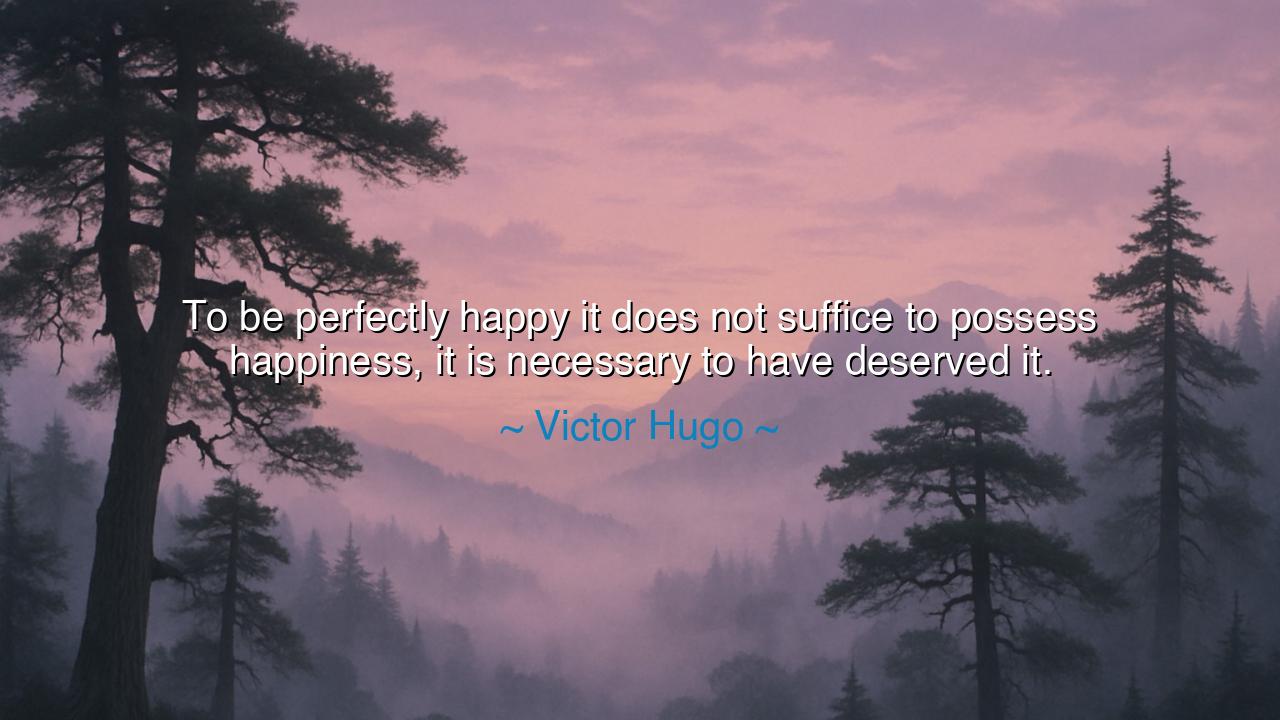
To be perfectly happy it does not suffice to possess happiness
To be perfectly happy it does not suffice to possess happiness, it is necessary to have deserved it.






“To be perfectly happy it does not suffice to possess happiness, it is necessary to have deserved it.” Thus spoke Victor Hugo, the titan of letters, the prophet of justice, whose pen carved light from the darkness of his age. In this single line, he distills a truth both moral and eternal — that true happiness is not a gift to be seized, but a grace to be earned. It is not enough to be surrounded by comfort or crowned with fortune; unless one’s heart and conscience are in harmony with the good, the soul remains restless, unfulfilled. Deserved happiness is not the fleeting pleasure of circumstance, but the deep peace that comes when one’s joy is founded upon virtue, sacrifice, and honor.
The origin of this quote reflects Hugo’s lifelong meditation on justice, redemption, and the human spirit. Living through revolution, exile, and the storms of political change, he saw both the suffering of the poor and the vanity of the powerful. He knew that happiness unearned — happiness built upon the misery or neglect of others — is hollow, like a palace raised upon sand. Through works like Les Misérables and The Hunchback of Notre-Dame, Hugo showed that true joy arises not from possession, but from righteousness — that the soul finds peace only when it has been tested, when it has labored, and when it has given itself to something greater than self. His words call not merely for contentment, but for worthiness — that sacred alignment between the heart’s desires and the soul’s integrity.
When Hugo says, “it is necessary to have deserved it,” he draws a line between the easy comfort of pleasure and the earned peace of purpose. To possess happiness without deserving it is like wearing a crown stolen from another’s brow — its weight becomes unbearable. The one who gains joy through deceit, cruelty, or idleness will find it poisoned, for conscience will not allow rest. But the one who strives, who suffers, who lifts others even while climbing, finds in the end a happiness that no misfortune can destroy. For such happiness is born not from luck, but from character. It is a joy anchored in the knowledge that one has lived rightly, loved deeply, and harmed none.
Consider the story of Jean Valjean, Hugo’s immortal creation — a man who once stole bread in hunger and was cast out by society. Though he gained temporary freedom through cunning, it brought him no peace. His true redemption — and therefore his true happiness — came only when he turned his strength to good, when he lifted others from despair as he himself had been lifted. His journey from criminal to saint is the embodiment of Hugo’s teaching: that happiness without virtue is an illusion, but happiness that follows sacrifice is eternal. Valjean’s joy, hard-earned through repentance and service, was pure because it was deserved.
This truth shines across the tapestry of human history. Nelson Mandela, after decades of imprisonment, emerged not with vengeance but with forgiveness in his heart. His happiness, when freedom finally came, was not the indulgence of victory but the peace of a man who had walked the long road of justice. He had deserved his joy through endurance, through restraint, through faith in the goodness of his cause. Contrast this with those who seize power unjustly, who revel in triumphs built on deceit or oppression — their laughter is hollow, their happiness brittle. For only that joy which has been purified by effort and compassion can endure.
Hugo’s wisdom also carries a warning for the modern soul. In a world that seeks happiness in possessions, appearances, and fleeting pleasures, he reminds us that possession without purpose is emptiness. Many today have what they call happiness — comfort, wealth, admiration — yet still feel a void, for they have not earned their peace through meaning or service. To deserve happiness is to have lived in truth — to know that your joys do not rest upon another’s sorrow, that your comfort has not cost your integrity. The deserving soul sleeps soundly, not because life is perfect, but because it has been lived with courage and love.
So, dear listener, take this lesson to heart: seek not happiness alone, but the worthiness to hold it. Do not crave ease, but the strength to labor for what is right. Do not envy the man who seems blessed, but the one who is at peace with himself. Let your happiness be the fruit of your goodness, your perseverance, your compassion. Build joy not on indulgence, but on gratitude and moral strength. For fleeting pleasure dies with the hour, but deserved happiness — the happiness born of honor — shines like a flame that no wind can quench.
For as Victor Hugo teaches, the soul’s greatest blessing is not in what it receives, but in what it becomes. To possess happiness is human — to deserve it is divine. And when your heart can look upon its joy and say, “I have earned this through truth and love,” then, and only then, will you know what it means to be perfectly happy.






AAdministratorAdministrator
Welcome, honored guests. Please leave a comment, we will respond soon